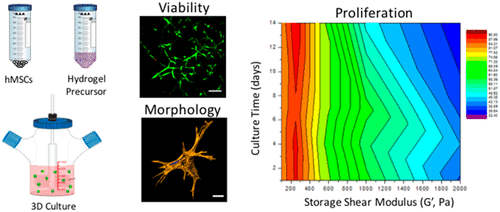当前位置:
X-MOL 学术
›
ACS Biomater. Sci. Eng.
›
论文详情
Our official English website, www.x-mol.net, welcomes your
feedback! (Note: you will need to create a separate account there.)
Hydrogel Modulus Affects Proliferation Rate and Pluripotency of Human Mesenchymal Stem Cells Grown in Three-Dimensional Culture
ACS Biomaterials Science & Engineering ( IF 5.4 ) Pub Date : 2017-11-17 00:00:00 , DOI: 10.1021/acsbiomaterials.7b00266 Revital Goldshmid 1 , Dror Seliktar 1
ACS Biomaterials Science & Engineering ( IF 5.4 ) Pub Date : 2017-11-17 00:00:00 , DOI: 10.1021/acsbiomaterials.7b00266 Revital Goldshmid 1 , Dror Seliktar 1
Affiliation

|
Hydrogels have been used extensively with various cell types in three-dimensional (3D) culture, including with human mesenchymal stem cells (hMSCs). Here, we report on the use of poly(ethylene glycol) (PEG)-conjugated fibrinogen hydrogels to grow bone marrow-derived hMSCs in 3D culture. The initial modulus of the PEG-fibrinogen (PF) hydrogels was varied to study the influence of the stiffness on the proliferation response of the cells growing within. Shear rheology was used to quantify the changes to the initial material properties; the shear storage modulus of the PF was controlled by changing the concentration of synthetic PEG cross-linker, while keeping the fibrinogen concentration constant. Cell culture was performed during a 14-day experiment to quantify the cell proliferation response in the different modulus materials tested. The hMSCs were recovered from the hydrogels by mild enzymatic dissolution, and characterized for proliferation and cell number using cytometry. The results indicate a modulus-dependent response from the cells, and the ability to preferentially define initial hydrogel modulus that favors higher proliferation and multipotency of the hMSCs. Bioactive supplements added to the hydrogels, including exogenous fibronectin (Fn) and von willebrand factor (vWf) were used to further stimulate the proliferation response of the hMSCs in the hydrogel cultures, without altering their multipotency. These insights underscore the importance of mechanical properties in regulating cell proliferation in a 3D culture milieu. The versatility of the hydrogel culture environment and the ability to control mechanical properties for cell-fate determination further highlight the significance of a modular approach when developing materials that ultimately optimize stem cell cultures.
中文翻译:

水凝胶模量影响三维培养中人间充质干细胞的增殖速率和多能性。
水凝胶已广泛用于三维(3D)培养中的各种细胞类型,包括人间充质干细胞(hMSCs)。在这里,我们报道了在3D培养中使用聚乙二醇(PEG)偶联的纤维蛋白原水凝胶来培养源自骨髓的hMSCs。改变PEG-纤维蛋白原(PF)水凝胶的初始模量,以研究刚度对其中生长的细胞的增殖反应的影响。剪切流变学用于量化初始材料性能的变化。通过改变合成PEG交联剂的浓度来控制PF的剪切储能模量,同时保持纤维蛋白原的浓度恒定。在14天的实验过程中进行了细胞培养,以量化测试的不同模量材料中的细胞增殖反应。通过温和的酶促溶解从水凝胶中回收hMSC,并使用细胞计数仪表征增殖和细胞数。结果表明细胞的模量依赖性反应,以及优先定义初始水凝胶模量的能力,有利于hMSC的更高增殖和多能性。添加到水凝胶中的生物活性补充剂,包括外源性纤连蛋白(Fn)和血管性假血友病因子(vWf),可用于进一步刺激hMSC在水凝胶培养物中的增殖反应,而不会改变它们的多能性。这些见解强调了机械特性对调节3D培养环境中细胞增殖的重要性。
更新日期:2017-11-19
中文翻译:

水凝胶模量影响三维培养中人间充质干细胞的增殖速率和多能性。
水凝胶已广泛用于三维(3D)培养中的各种细胞类型,包括人间充质干细胞(hMSCs)。在这里,我们报道了在3D培养中使用聚乙二醇(PEG)偶联的纤维蛋白原水凝胶来培养源自骨髓的hMSCs。改变PEG-纤维蛋白原(PF)水凝胶的初始模量,以研究刚度对其中生长的细胞的增殖反应的影响。剪切流变学用于量化初始材料性能的变化。通过改变合成PEG交联剂的浓度来控制PF的剪切储能模量,同时保持纤维蛋白原的浓度恒定。在14天的实验过程中进行了细胞培养,以量化测试的不同模量材料中的细胞增殖反应。通过温和的酶促溶解从水凝胶中回收hMSC,并使用细胞计数仪表征增殖和细胞数。结果表明细胞的模量依赖性反应,以及优先定义初始水凝胶模量的能力,有利于hMSC的更高增殖和多能性。添加到水凝胶中的生物活性补充剂,包括外源性纤连蛋白(Fn)和血管性假血友病因子(vWf),可用于进一步刺激hMSC在水凝胶培养物中的增殖反应,而不会改变它们的多能性。这些见解强调了机械特性对调节3D培养环境中细胞增殖的重要性。











































 京公网安备 11010802027423号
京公网安备 11010802027423号